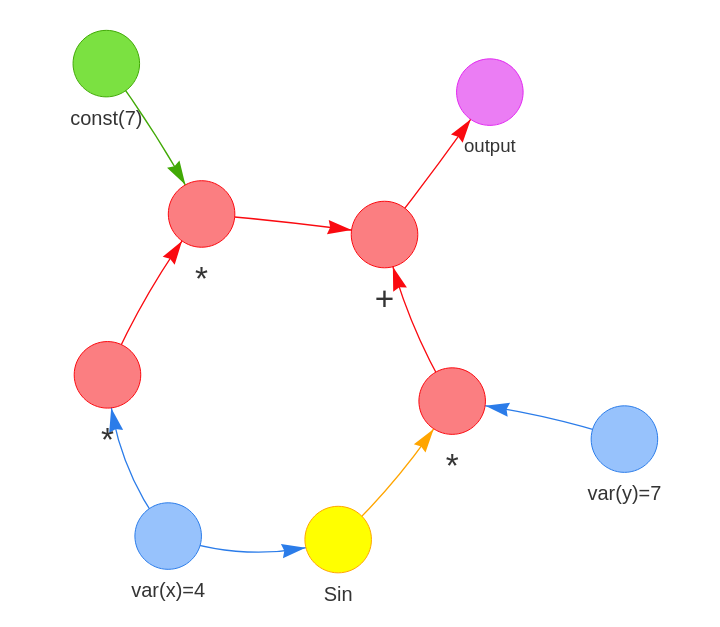Implementation of a simple automatic differentiation (forward mode with dual number and backward mode with NetworkX for the computation graph) with mathematical explanations.
The mathematical backgrounds of the forward and backward modes are explained here
Import packages :
from DualNumber import DualNumber
from MathLib.Functions import sin, cos, tan, log, expDefine a function
def f(x, y):
return sin(x)*y + 7*(x*x)Compute the partial derivative
x = DualNumber(4, 1)
y = DualNumber(7, 0)
res = f(x, y)
f_val = res.primal # f evaluted at (x,y)=(4,7)
df_x = res.tangent # df/dx at (x,y)=(4,7)Compute the partial derivative
x = DualNumber(4, 0)
y = DualNumber(7, 1)
res = f(x, y)
f_val = res.primal # f evaluted at (x,y)=(4,7)
df_y = res.tangent # df/dy at (x,y)=(4,7)Compute the directionnal derivative
x = DualNumber(4, 0.5)
y = DualNumber(7, 3)
res = f(x, y)
f_val = res.primal # f evaluted at (x,y)=(4,7)
dir_derivative = res.tangent # directionnal derivative at (x,y)=(4,7) in direction a=(0.5,3)See more examples here
Import packages :
from ComputationLib.Vector import Vector
from MathLib.Functions import sin, log, tan, exp, cosDefine a function :
def f(x, y):
return sin(x)*y + 7*(x*x)Define variables
x = Vector(4, requires_grad=True)
y = Vector(7, requires_grad=True)
res = f(x, y)
res.backward()Get the partial derivatives
dx = x.grad
dy = y.gradYou can also display the computation graph :
from ComputationLib.ComputationGraph import ComputationGraphProcessor
cgp = ComputationGraphProcessor(res, human_readable=True)
cgp.draw(display_nodes_value=True)Self reflective operations (i.e
You can set the label option when declaring new Vector to render the variable name during the graph drawing (i.e: x = Vector(14.23, requires_grad=True, label="x")).
See more examples here
You can define your own functions as follows :
import math
from DualNumber import DualNumber
from MathLib.FunctionWrapper import Function
class MyCos(Function) :
def __init__(self):
super().__init__() # needed
def compute(self, input_value):
if type(input_value) is DualNumber:
return DualNumber(math.cos(input_value.primal), - input_value.tangent*math.sin(input_value.primal))
return math.cos(input_value)
def derivative(self, input_value):
return -math.sin(input_value)
mycos = MyCos().apply()Then :
mycos(4)The compute method is used for the forward mode and for computing the value of the function when evaluating it. The derivative is used for the backward mode.
The lib currently accepts only scalar functions, but by using numpy instead of math lib for each function we can now evaluate scalar field functions :
import numpy as np
from DualNumber import DualNumber
from MathLib.FunctionWrapper import Function
class NumpyCos(Function) :
def __init__(self):
super().__init__() # needed
def compute(self, input_value):
if type(input_value) is DualNumber:
return DualNumber(np.cos(input_value.primal), - input_value.tangent*np.sin(input_value.primal))
return np.cos(input_value)
def derivative(self, input_value):
return -np.sin(input_value)
cos = NumpyCos().apply()See more examples here
The Jacobian of a function
def computeJacobianBackward(inputs, func_res):
number_inputs = len(inputs)
number_outputs = len(func_res)
jacobian = np.zeros((number_inputs, number_outputs))
for index, fi in enumerate(func_res):
fi.backward()
for a_index, a in enumerate(inputs):
jacobian[index][a_index] = a.grad
return jacobianSee more examples here
cd app
pip install -r requirements.txtThread safe can be implemented by hardening the access to the computation graph for each vector and probably the uuid generation for vector id. But it's not really the purpose of that lib.
